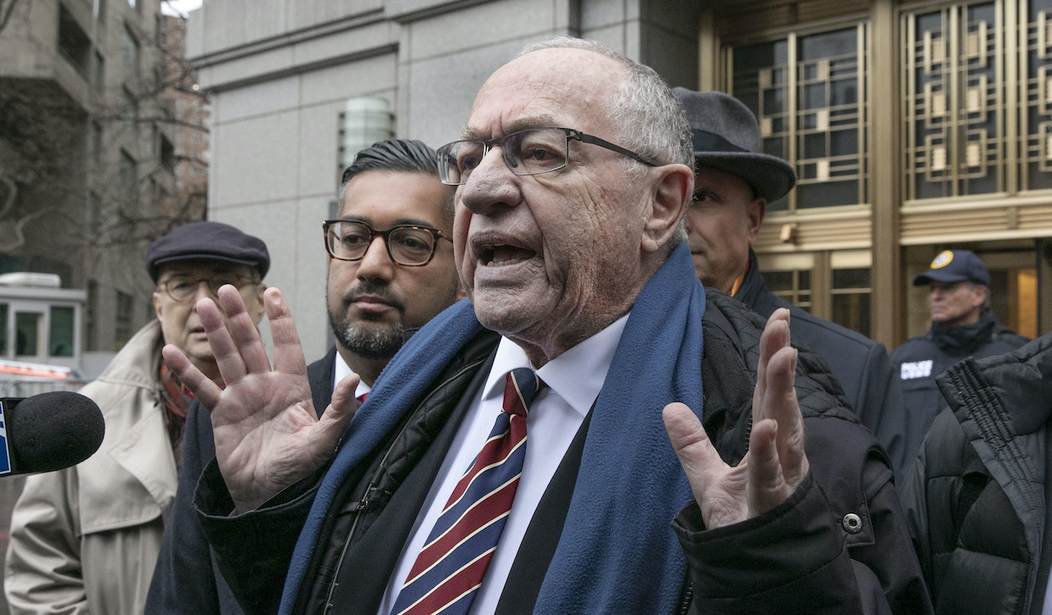Constitutional law attorney Alan Dershowitz is warning that one of President Donald Trump's Day One executive actions might not survive a legal challenge already lodged against it.
Shortly after he was sworn in, Trump issued an executive order—titled "Protecting the Meaning and Value of American Citizenship"—that tightens the grounds on which U.S. citizenship will be granted to those born in America.
In an episode of "The Dershow," a skeptical Dershowitz said that while he believes birthright citizenship was "a dumb idea," he doesn't think Trump can nullify it through executive action.
Hours into Trump's presidency, the American Civil Liberties Union (ACLU) launched a lawsuit over the executive order, arguing that it violates the 14th Amendment. Although Trump had considered ending birthright citizenship during his first term, he never issued an order on it until now.
"He said he was gonna end birthright citizenship. I think birthright citizenship was a dumb idea. If I were writing a constitution, I don't think I would put birthright citizenship in the constitution," remarked Dershowitz. "But let me read to you what the Constitution says and then you can make your decision as to whether it applies."
Recommended
Dershowitz then quoted Section One of the 14th Amendment, which states, "All persons born or naturalized in the United States, and subject to the jurisdiction thereof, are citizens of the United States and of the State wherein they reside."
Speaking about the term "born," Dershowitz said that "there's no ambiguity about that word." He also highlighted a key part, adding, "And here's the critical clause: and, not or, and subject to the jurisdiction thereof."
That portion about being "subject to the jurisdiction thereof" is where the issue lies, Dershowitz said. The provision was passed after the Civil War to overturn the Supreme Court's 1857 decision in Dred Scott v. Sanford, which excluded African Americans from eligibility for U.S. citizenship solely based on race.
Dershowitz said that it would likely take congressional action to clear up this point of contention.
"I think Congress can pass that law because the Constitution doesn't define what it means to be subject to the jurisdiction of the United States. I don't think the president could do that. I don't think a president can declare that a person who was born in the United States is no longer subject to its jurisdiction," Dershowitz assessed. "The courts will ultimately decide that, but my best view, as somebody who studied the Constitution for a long time, is that, at the very least, it would take congressional legislation to make a person born in the United States a non-citizen by making that person not subject to the jurisdiction of the United States."
Without a congressional resolution, a law to that effect, Dershowitz said he just doesn't see it going Trump's way.
"I'm a pretty clever lawyer. I won a lot of cases interpreting the Constitution and often interpreting it in ways that are not obvious," Dershowitz said. He noted that if Trump personally asked him for his opinion on the order's chances of survival in court, Dershowitz would "put [his] brain to it." However, he'd "have to call back and say 'Sorry, Mr. President, I can't figure out a way around this one.'"
Dershowitz went on to define what "anchor babies" are and how some take advantage of this clause to be bestowed citizenship or legal residency.
"Okay, so, if you get what are invidiously called anchor babies—I don't like that term—but babies who were born in the United States to parents who have no connection to the United States: tourists coming in to ski, and the woman goes into labor early and has a baby," Dershowitz explained. "The baby never spends more than a week in the United States, goes back to wherever, France or anywhere else, lives life as a French citizen, but then at age 60 decides, 'Maybe I'd like to move to the United States. I'm a citizen.' Should that person be a citizen? Of course not!"
On the 2024 campaign trail, Trump promised to close loopholes in U.S. immigration law, such as outlawing "birth tourism" and ending automatic citizenship for children of illegal aliens.
"As part of my plan to secure the border, on Day One of my new term in office, I will sign an executive order making clear to federal agencies that under the correct interpretation of the law, going forward, the future children of illegal aliens will not receive automatic U.S. citizenship," Trump vowed at the time. "My policy will choke off a major incentive for continued illegal immigration, deter more migrants from coming, and encourage many of the aliens Joe Biden has unlawfully let into our country to go back to their home countries."
Trump's campaign said the then-impending executive order would "explain the clear meaning of the 14th Amendment" and therefore "discourage future waves of illegal immigration to exploit this misapplication of citizenship."
Illegal aliens have long abused birthright citizenship as a means to remain in the country after unlawfully entering and accordingly were rewarded for breaking U.S. immigration law. Under the "incorrect interpretation" of the Constitution, children of foreign nationals are eligible to receive certain government benefits reserved for U.S. citizens, including a host of social welfare programs and taxpayer-funded healthcare, all of which profit the illegal alien parents, Trump's campaign said. Moreover, the Trump team argued:
- The purpose of the 14th Amendment had nothing to do with the citizenship of immigrants, let alone the citizenship of the children of illegal aliens. Its purpose was to extend citizenship to people newly freed from slavery, whose status was left in question after the infamous case Dred Scott v. Sandford.
- The framers of the 14th Amendment made clear that 'persons born in the United States who are foreigners, aliens [or] who belong to the families of ambassadors or foreign ministers' are not 'subject to the jurisdiction' of the U.S.
- For years, open-borders proponents have deliberately misinterpreted 'subject to the jurisdiction' in the 14th Amendment to mean merely subject to American law, which is the case for anyone physically present in the United States.
- This twisting of the amendment's meaning and intent has caused America to become one of the few countries in the world to extend citizenship to the children of illegal aliens even if both parents are not citizens nor even legally present in the United States, thus diluting the privileges that Americans are entitled to.
Trump's executive order, now signed, says U.S. citizenship does not automatically extend to an individual born in the United States when (1) that person's mother was unlawfully present in the country and the father was not a U.S. citizen or lawful permanent resident at the time of said subject's birth or (2) the mother's presence in the U.S. at the time of said subject's birth was lawful but temporary—like, but not limited to, visiting the U.S. under the auspices of the visa waiver program or visiting on a student, work, or tourist visa—and the father was not a U.S. citizen or lawful permanent resident at the time of said subject's birth.
A president declaring a person born on American soil a non-citizen through executive action also raises the broader issue of a president's executive powers and what can or can't be done under a presidential declaration, Dershowitz said. He emphasized that the U.S. Constitution is based on separation of powers: three co-equal branches of government, with the president being the executive branch, the only branch that resides in one person.
Some legal scholars suspect that Trump is testing the issue and intends for it, by design, to move through the courts, ultimately landing before SCOTUS. As our own Kurt Schlichter pointed out, "it is going to be heard, and it is going to be analyzed. That's how things should work. You make arguments, and then judges consider them in the context of precedent and rule accordingly."
"Denying citizenship to U.S.-born children is not only unconstitutional — it's also a reckless and ruthless repudiation of American values," Anthony D. Romero, the ACLU's executive director, said in a press statement. "Birthright citizenship is part of what makes the United States the strong and dynamic nation that it is." Romero claimed that Trump's order creates "a permanent subclass of people born in the U.S. who are denied full rights as Americans."
"We will not let this attack on newborns and future generations of Americans go unchallenged," the ACLU head said.

























Join the conversation as a VIP Member